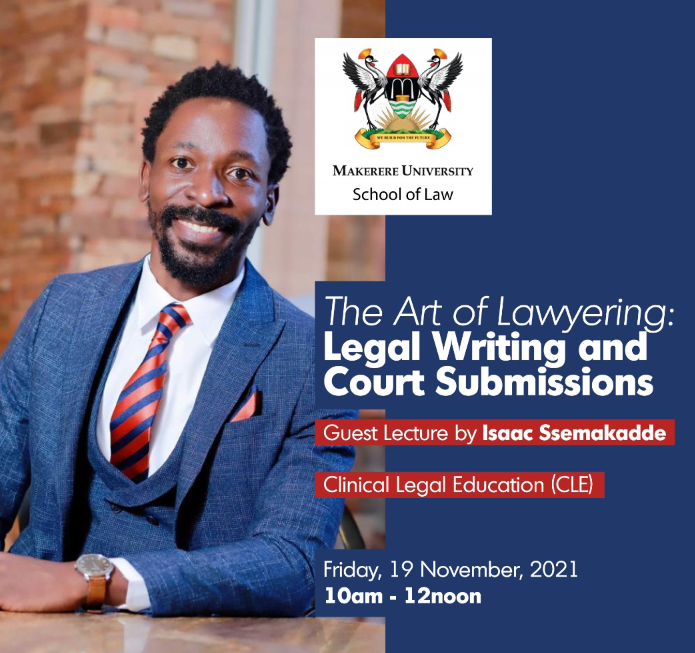Renowned human rights lawyer and activist Isaac Ssemakadde has warned on the festering phenomenon of ‘Kwashiorkor lawyers’ who do not keep tabs on the best forms and precedents in the legal industry.
Ssemakadde made the remarks on Friday, 19 November 2021, where he was a Guest Lecturer in an event organized by Makerere School of Law, hosted on the Zoom platform.
In an oversubscribed 2-hour lecture titled _‘The Art of Lawyering: Legal Writing and Court Submissions’_, the brilliant legal rebel generously shared a wide range of tips and tricks for navigating the increasingly complex and competitive legal terrain.
Ssemakadde noted that it is crucial for lawyers to pay keen attention to peer-reviewed forms and precedents that can enrich one’s technique of lawyering.
According to the former corporate lawyer who resigned his job in a white-shoe law firm after only six months to start a legal aid foundation, leading texts such as ‘Kelly’s Draftsman’ and ‘Encyclopaedia of Forms and Precedents’ by LexisNexis, and ‘Bullen & Leake & Jacob’s Precedents of Pleadings’ by Sweet & Maxwell were universally accepted as a practical lawyer’s compass.
He observed that to make the grade of a good lawyer was fairly easy, as all one had to do is to keep abreast with the times, ‘by collecting the most functional forms and precedents that one is likely to need in their day-to-day practice.’
‘Lawyers like to threaten people with very thick documents, and people think they come from their heads! No, they come from templates and precedents. Good lawyers know these things. And if you have never seen these things, you are going to remain poor and mediocre,’ Ssemakadde stated.
‘You are going to remain a Kwashiorkor lawyer, simply because you are not exposed to the sunlight of the best forms and precedents. No one is inventing the law, no one is starting the law today. The law is very old, and the best forms and precedents have been compiled by those good lawyers who wanted things to be shared.”
The social media icon encouraged lawyers to make use of the open source apps and websites that are offering legal documents—‘the A to Z of forms and precedents’—either free or at a small fee of $1.
Submissions a tie-breaker
Ssemakadde also explained the crucialty of written submissions in the pandemic-imposed court environment.
The award-winning advocate, who is also the founder and chief executive officer of human rights watchdog Legal Brains Trust, said submissions (whether oral or written) are almost always the tie-breaker.
He noted that students graduate from law schools and the Law Development Centre, minus having a grip on the finer details of submissions.
Ssemakadde said: ‘Lawyers learn the art of delivering an effective submission in practice, and no where else. The reality is that everything boils down to a submission. The essence of a submission is to persuade a judge.’
‘The essence of correspondence on the other hand is to persuade the respondent or the reader. So, lawyers must write in a bespoke style to achieve the desired objective; good legal writing is the one calculated to invoke a particular action of the targeted person.’
Woe unto mediocrity
The principal advocate at the highly-acclaimed Centre for Legal Aid further advised that it is important for lawyers to exterminate the cancer of mediocrity, lest it drags them to the garbage heap.
‘Very many young lawyers say people like Ssemakadde are very harsh in training the doting of the i’s crossing of the t’s. They prefer to remain in their English of is and was, and this and that, and to practice law with such arrogance! Woe unto them.’
Empathizing with budding lawyers who crave learning the technique of legal writing and court submissions from elite law firms but do not have such access or the necessary connections, Ssemakadde urged that they should make the best use of court proceedings and court documents ‘which are free for all’.
‘If you do not have access to the so-called best chambers, go to court and learn by observing them while in action, and photocopy their pleadings and submissions, and study them critically.’
‘Don’t just read judgments which lie to you. Judgments are the distilled product of a very fierce battle where the art of lawyering was displayed at many hidden stages. So, if you just read as many judgments as possible in a bid to hack the art of lawyering, you are like a person eating popcorn, expecting to grow some muscle.’
![]()
























